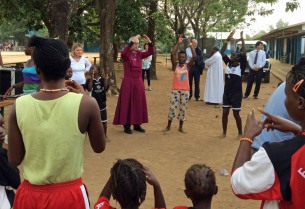In Guinea and Liberia the rates of new infections are slowing or declining, as stricter measures for isolating people infected, identifying and monitoring contacts and ensuring safe burials become more widely implemented. However, in Sierra Leone infection rates are still raising. Overall this year across the three countries there have been over 18,000 Ebola cases (confirmed, probable and suspected) and 6,841 reported deaths.
Global news headlines are full of the international health teams coming to work in West Africa, yet the local health teams also deserve outstanding recognition for their courageous work caring for the sick since January, at great personal costs as hospitals and clinics often lacked the personal protective equipment (PPE) needed to keep them safe. These local teams are also going out with prevention messaging, feeding those in quarantine, ensuring safe burials, and challenging the stigma that survivors can face when they return home. Churches and other faith communities are often key participants in these activities, as they work closely with the national and district Ebola control systems in each country.
Earlier this week, the Archbishop of Canterbury, Justin Welby, visited Freetown, Sierra Leone, with a message of hope and solidarity for all those suffering amid the Ebola outbreak across West Africa. The Archbishop preached at St George’s Cathedral in the Sierra Leonean capital of Freetown. He told those gathered that “your suffering and endurance across the afflicted countries have echoed around the world”, adding that “you are remembered at every moment by God”. Stressing the solidarity of Christians and Muslims in England for those suffering in West Africa, he said: “In our churches and mosques… we pray for you, long for good news, and are in pain because of your pain.”
He also visited a church-run therapy centre for children affected by Ebola, where he met with young survivors of Ebola, many of them orphans, hearing how some were there as they was not welcome in their home village.
Archbishop Justin also met and prayed with faith and community leaders, including the Bishop of Freetown, the Rt Revd Thomas Arnold Ikunika Wilson. More information about his visit can be found here, and his sermon can be found here.
So as we get together with our families this Christmas, let us remember these communities whose lives have been turned upside down by the current crisis.
- We thank God for the strength and commitment of Churches to their communities as they offer pastoral care, food for the quarantined and support to survivors
- We pray for those who mourn, particularly as they have not been able to use traditional funeral rites for those they love
- We pray for those suffering from Ebola that they may be treated with dignity
- We pray for those caring for those affected by Ebola, for strength to keep caring when so many have died and we pray for supplies of PPE to keep them safe
- We pray for openness to the Ebola prevention messages in remote areas that are still severely affected, so that the sick receive care and the dead are safely buried
The effects of Ebola reach right across Guinea, Liberia and Sierra Leone. Schools are closed, so children are missing a year of education, the churches are struggling to pay teachers and clergy as they have lost their regular income from school fees, while the income from congregations is reduced.
Bishop Jacques Boston of the Diocese of Guinea reports that two medical centres in the interior are closed as they can no longer pay the doctors and nursing assistants. He says “these medical centres are critical in offering health care to communities set deep in the interior, often hours’ if not days’ journey from the nearest urban centres and hospitals. 70% of the cases treated in these clinics are malaria and yellow fever. With the closure of these one can only imagine the effect on the death rate from these two killer diseases.”
Markets are disrupted reducing food availability and increasing prices. For example, in Sierra Leone recent surveys found that nearly half of the 463 traders responding reported both reduced market supplies and inadequate food availability. Travel restrictions and high transportation costs were the most commonly cited reason for below-average stock levels on markets.
Anglican and Episcopal partners are still running emergency appeals and providing support for churches in West Africa include:
- The Diocese of Chichester
- Episcopal Relief & Development
- Us (formerly USPG)
- Trinity Wall Street
For further information, read: https://anglicanalliance.org/news/19844

